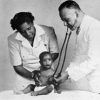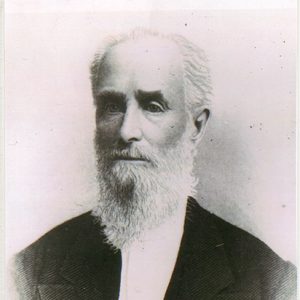calsfoundation@cals.org
Hiram Abiff Whittington (1805–1890)
Hiram Abiff Whittington was a businessman, politician, and philanthropist. He established the state’s first successful lending library, ran several businesses in Hot Springs (Garland County), and served as a state representative. He donated land to both the First Presbyterian Church and St. Mary’s Catholic Church in Hot Springs. His letters to his family provide a wealth of information about life in early frontier Arkansas.
Hiram Whittington was born January 14, 1805, in Boston, Massachusetts, the son of William Whittington Jr., a Puritan schoolmaster, and Hepsabeth Lincoln. He had four brothers and five sisters.
At age fifteen, Whittington learned the printing trade and found a job with the Nantucket Enquirer, where he stayed three years. He moved to Brooklyn, New York, where he worked for Alden Spooner, who introduced him to William E. Woodruff, editor of the Arkansas Gazette.
Whittington moved to Little Rock (Pulaski County) in 1826 and began a career as a printer with the Arkansas Gazette. In 1832, as Whittington’s health began to fail, he sought the healing waters of Hot Springs. Whittington established the first mercantile in Hot Springs and developed a novaculite factory to manufacture and export whetstones. He was appointed postmaster and elected clerk of Hot Spring County in 1833. He established the state’s first successful lending library (after Woodruff had tried earlier in 1826).
Whittington wrote frequent letters to his family in Massachusetts, offering rare examples of written history from the state’s founding years and providing a wealth of detail, often unkind, about the state.
In 1839, Whittington opened the Chalybeate Springs boarding house, a resort for the sick using the springs. Area citizens elected Whittington to the Arkansas House of Representatives in 1838 and re-elected him in 1840 and 1850.
Whittington returned to Boston and married Mary Burnham on October 12, 1836. They raised six children, but only three lived to maturity. The Whittingtons moved back to Hot Springs, living in the Magnolia House, a log cabin facing Park Avenue. The Majestic Hotel once stood on the cabin’s site. Mary Whittington died April 7, 1851.
During the last few years of Whittington’s life, he donated land near his home to St. Mary’s Catholic Church and First Presbyterian Church. He died May 5, 1890, in Hot Springs and was buried in a cemetery off Mill Creek Road. His grave was moved in 1991 to the Whittington family plot in Hollywood Cemetery in Hot Springs, and a granite marker was placed at the original gravesite.
A street near St. Mary’s Catholic Church and First Presbyterian Church was named for Whittington. Whittington Park was established on the street’s western end. The Garland County Historical Society erected a monument in Whittington’s honor at the junction of Central, Park, and Whittington Avenues in Hot Springs in 1992.
For additional information:
Cunning, Charles W., Bobbie J. McLane, and Wendy Richter. Observations of Arkansas: The 1824–1863 Letters of Hiram Abiff Whittington. Hot Springs: Garland County Historical Society, 1997.
———. “The Whittington Project.” The Record 33 (1992): 127–37.
Hudgins, Mary D. “Hiram Abiff Whittington—Arkansas Anachronism.” The Record 1 (November 1960): 11–17.
Rhodes, Sonny. “Entrepreneur Extraordinaire.” Arkansas Democrat-Gazette, March 6, 2023, pp. 1D, 6D. Online at https://www.arkansasonline.com/news/2023/mar/06/ailing-printer-hiram-whittington-quit-gazette/ (accessed March 6, 2023).
———. “Giving Hot Springs the Business.” Arkansas Democrat-Gazette, March 13, 2023, pp. 1D, 6D. Online at https://www.arkansasonline.com/news/2023/mar/13/businessman-hiram-whittington-died-in-1890-but/ (accessed March 13, 2023).
Jill E. Hensarling
Ouachita Baptist University








Comments
No comments on this entry yet.